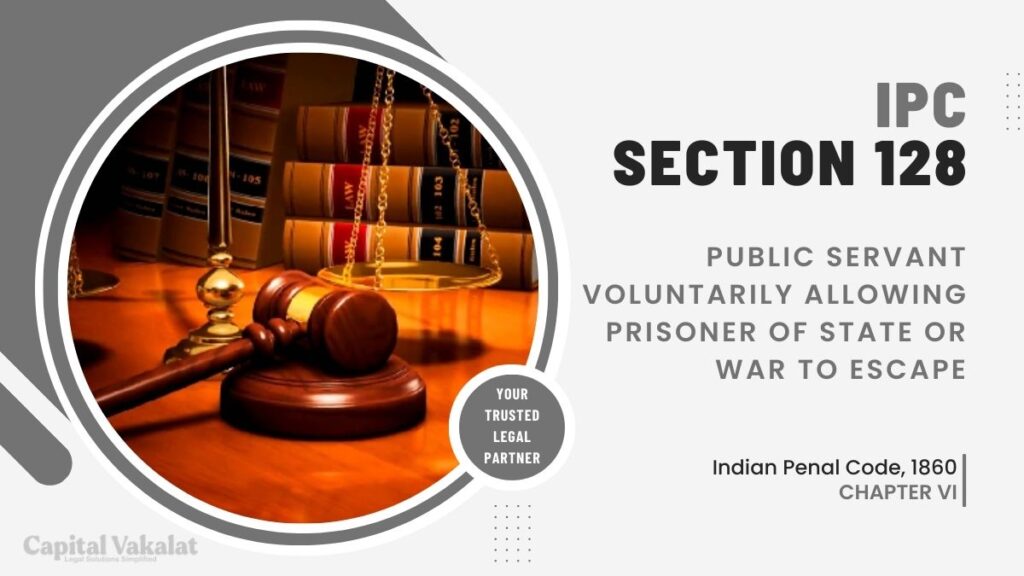In the realm of Indian law, Section 128 of the Indian Penal Code (IPC) holds a significant place. It deals with the rather intriguing situation where a public servant, entrusted with the responsibility of safeguarding prisoners of the state or war, voluntarily allows such prisoners to escape.

This article dives into the depths of Section 128 IPC, dissecting its various aspects, historical significance, contemporary relevance, and the legal implications it carries.
Introduction
Section 128 of the IPC revolves around the conduct of a public servant, emphasizing the importance of their role in protecting prisoners. This legal provision acts as a safeguard to ensure that public servants act in the best interests of society and the nation.
Understanding Section 128 IPC
To understand Section 128 IPC better, it’s crucial to break it down into its core elements:
Voluntarily Allowing Prisoner to Escape
This clause underscores the willful act of letting a prisoner escape. The voluntary nature of this act makes it a criminal offense.
Public Servant’s Role
The public servant, in this context, refers to government employees, military personnel, or any person holding an official position who is entrusted with the custody of prisoners.
Prisoner of State or War
The section covers two categories of prisoners: those related to the state or involved in war-related conflicts. Their escape can have significant consequences.
Historical Significance
Section 128 of the IPC can be traced back to the colonial era. It reflects the concern of the British government to prevent any mishandling of prisoners, especially during times of political unrest.
Relevance in Modern Times
Although Section 128 IPC originated during a different era, it continues to be relevant today. The prevention of prisoner escape remains a critical aspect of maintaining law and order.
Cases and Precedents
Several cases over the years have helped interpret and apply Section 128 IPC. These cases provide valuable insights into its implementation.
Legal Implications
Violating Section 128 IPC can result in serious legal consequences for the public servant involved. This includes criminal charges and potential imprisonment.
Criticisms and Controversies
As with any legal provision, Section 128 IPC is not without criticism. Some argue that it may be misused or applied unfairly.
Enforcement and Penalties
Enforcing Section 128 IPC is vital to ensure the protection of prisoners. The penalties for its violation serve as a deterrent.
Role of Human Rights
The application of Section 128 IPC should be in accordance with human rights standards, ensuring the fair and just treatment of prisoners.
International Perspective
This section looks at how similar provisions are addressed in international law and their implications on global relations.
Conclusion
Section 128 of the IPC stands as a testament to the importance of safeguarding prisoners, be it in times of conflict or under state custody. It serves as a reminder of the legal obligations of public servants and the consequences they may face if they allow prisoners to escape.
FAQs
Are there any recent cases that highlight the relevance of this section?
Yes, several recent cases have highlighted the significance of Section 128 IPC, especially in cases involving political prisoners.
How does international law view the prevention of prisoner escapes?
International law emphasizes the importance of respecting the rights of prisoners, even during times of conflict.
Can Section 128 IPC be misused against public servants?
While there is potential for misuse, the legal system aims to prevent such abuse and ensures due process.
What should a public servant do to avoid violating Section 128 IPC?
A public servant should diligently fulfill their duties, ensuring the security and proper treatment of prisoners under their care.